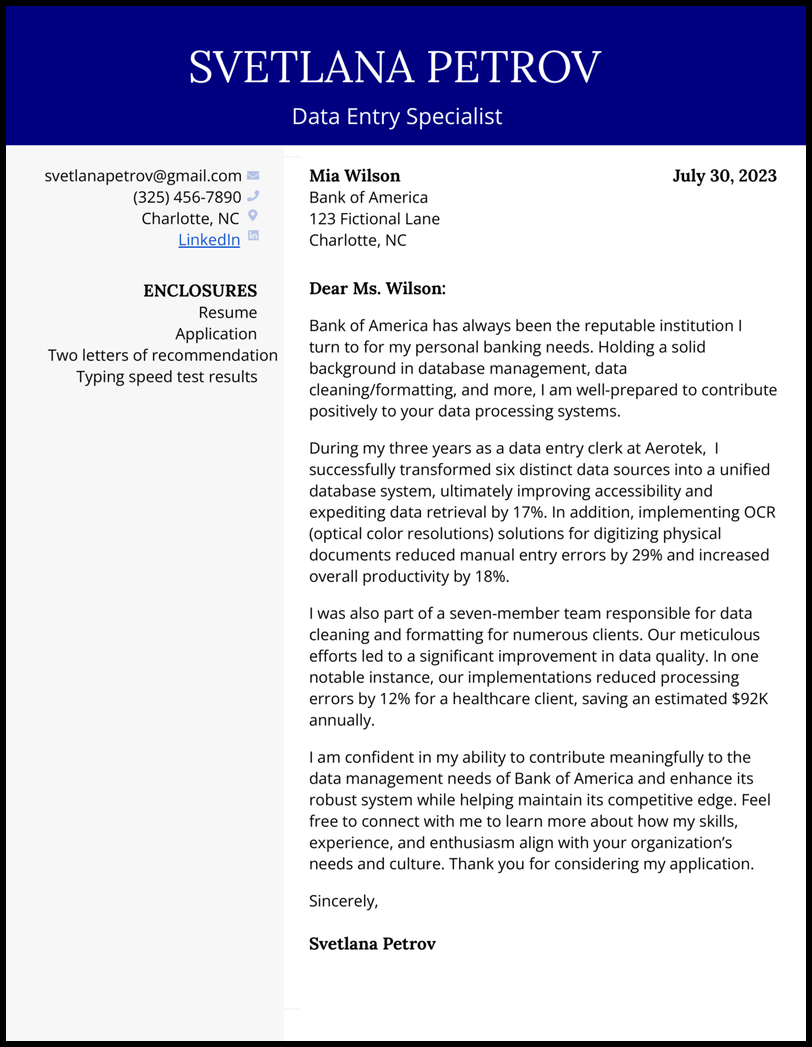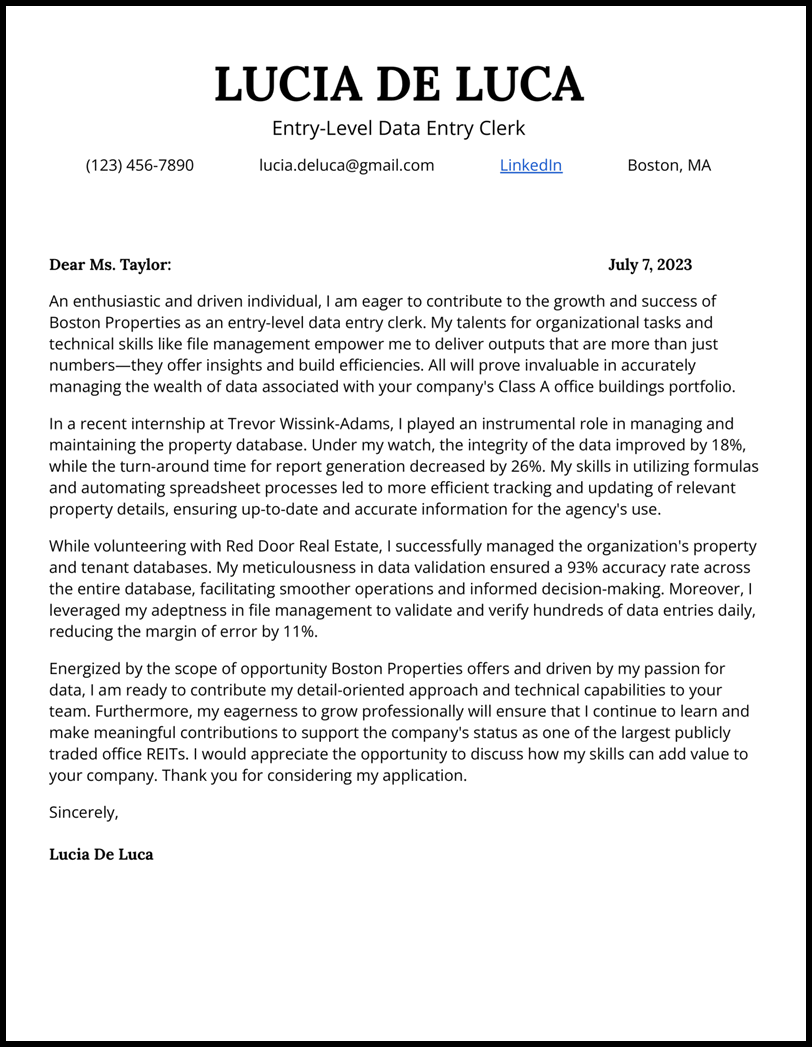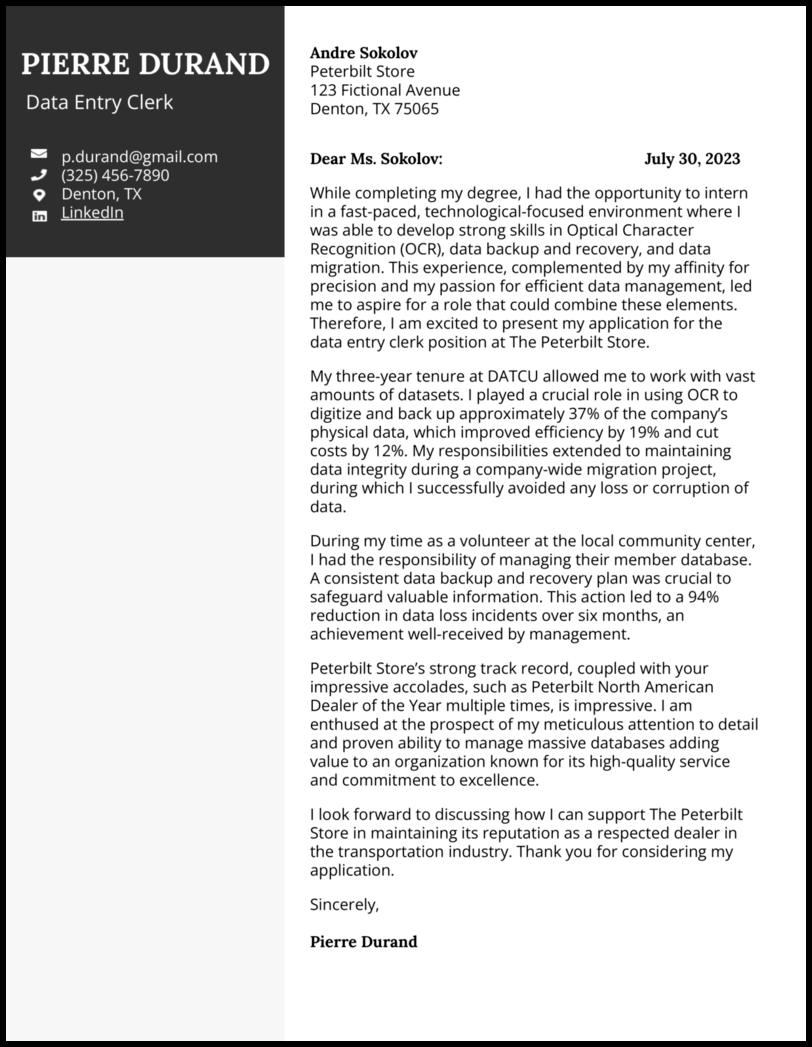






Simply put, you transform paper to pixels—you enter clerical information into databases to make important data cleaner, safer, and more accessible for others. You handle everything from creating spreadsheets and documentstto checking them against source documents for errors.
But how do you write a cover letter that’s concise, accurate, high-quality, and complements your data entry resume? What information should you include to demonstrate your strengths?
It’s easier than it seems. We’ve guided tons of people in data entry to their dream jobs and put together seven data entry cover letter examples for you to use. You can further enhance your application with our free cover letter generator to make a formidable submission.
Copy this text for your data entry cover letter!
123 Fictional Avenue
Charlotte, NC 33326
(123) 456-7890
July 30, 20XX
Mia Wilson
Bank of America
123 Fictional Lane
Charlotte, NC
Dear Ms. Wilson:
Bank of America has always been the reputable institution I turn to for my personal banking needs. Holding a solid background in database management, data cleaning/formatting, and more, I am well-prepared to contribute positively to your data processing systems.
During my three years as a data entry clerk at Aerotek, I successfully transformed six distinct data sources into a unified database system, ultimately improving accessibility and expediting data retrieval by 17%. In addition, implementing OCR (optical color resolutions) solutions for digitizing physical documents reduced manual entry errors by 29% and increased overall productivity by 18%.
I was also part of a seven-member team responsible for data cleaning and formatting for numerous clients. Our meticulous efforts led to a significant improvement in data quality. In one notable instance, our implementations reduced processing errors by 12% for a healthcare client, saving an estimated $92K annually.
I am confident in my ability to contribute meaningfully to the data management needs of Bank of America and enhance its robust system while helping maintain its competitive edge. Feel free to connect with me to learn more about how my skills, experience, and enthusiasm align with your organization’s needs and culture. Thank you for considering my application.
Sincerely,
Svetlana Petrov
Enclosures:
Resume
Application
2 letters of recommendation
Typing speed test results
Why this cover letter works
- Paying homage to the good reputation of a potential employer is an excellent starting point for a data entry cover letter.
- Strike a chord further with the recruiter with real, quantified impacts of skills that matter for the role you’re eyeing.
Level up your
cover letter game
Relax! We’ll do the heavy lifting to write your cover letter in seconds.
Copy this text for your entry-level data entry clerk cover letter!
123 Fictional Avenue
Boston, MA 33326
(123) 456-7890
July 30, 20XX
Dear Ms. Taylor:
An enthusiastic and driven individual, I am eager to contribute to the growth and success of Boston Properties as an entry-level data entry clerk. My talents for organizational tasks and technical skills like file management empower me to deliver outputs that are more than just numbers—they offer insights and build efficiencies. All will prove invaluable in accurately managing the wealth of data associated with your company’s Class A office buildings portfolio.
In a recent internship at Trevor Wissink-Adams, I played an instrumental role in managing and maintaining the property database. Under my watch, the integrity of the data improved by 18%, while the turn-around time for report generation decreased by 26%. My skills in utilizing formulas and automating spreadsheet processes led to more efficient tracking and updating of relevant property details, ensuring up-to-date and accurate information for the agency’s use.
While volunteering with Red Door Real Estate, I successfully managed the organization’s property and tenant databases. My meticulousness in data validation ensured a 93% accuracy rate across the entire database, facilitating smoother operations and informed decision-making. Moreover, I leveraged my adeptness in file management to validate and verify hundreds of data entries daily, reducing the margin of error by 11%.
Energized by the scope of opportunity Boston Properties offers and driven by my passion for data, I am ready to contribute my detail-oriented approach and technical capabilities to your team. Furthermore, my eagerness to grow professionally will ensure that I continue to learn and make meaningful contributions to support the company’s status as one of the largest publicly traded office REITs. I would appreciate the opportunity to discuss how my skills can add value to your company. Thank you for considering my application.
Sincerely,
Lucia De Luca
Why this cover letter works
- When there isn’t much professional experience to leverage, demonstrating genuine enthusiasm for the role helps.
- And beyond the zeal? Competence in relevant technology, attention to detail, excellent communication skills, and proven proficiency in formulas and data handling should show in your entry-level data entry clerk cover letter.
Copy this text for your data entry clerk cover letter!
123 Fictional Avenue
Denton, TX 75065
(123) 456-7890
July 30, 20XX
Andre Sokolov
Peterbilt Store
123 Fictional Avenue
Denton, TX 75065
Dear Ms. Sokolov:
While completing my degree, I had the opportunity to intern in a fast-paced, technological-focused environment where I was able to develop strong skills in Optical Character Recognition (OCR), data backup and recovery, and data migration. This experience, complemented by my affinity for precision and my passion for efficient data management, led me to aspire for a role that could combine these elements. Therefore, I am excited to present my application for the data entry clerk position at The Peterbilt Store.
My three-year tenure at DATCU allowed me to work with vast amounts of datasets. I played a crucial role in using OCR to digitize and back up approximately 37% of the company’s physical data, which improved efficiency by 19% and cut costs by 12%. My responsibilities extended to maintaining data integrity during a company-wide migration project, during which I successfully avoided any loss or corruption of data.
During my time as a volunteer at the local community center, I had the responsibility of managing their member database. A consistent data backup and recovery plan was crucial to safeguard valuable information. This action led to a 94% reduction in data loss incidents over six months, an achievement well-received by management.
Peterbilt Store’s strong track record, coupled with your impressive accolades, such as Peterbilt North American Dealer of the Year multiple times, is impressive. I am enthused at the prospect of my meticulous attention to detail and proven ability to manage massive databases adding value to an organization known for its high-quality service and commitment to excellence.
I look forward to discussing how I can support The Peterbilt Store in maintaining its reputation as a respected dealer in the transportation industry. Thank you for considering my application.
Sincerely,
Pierre Durand
Why this cover letter works
- Weaving storytelling into the beginning of your data entry clerk cover letter, then relating it all to the position, will certainly captivate a hiring manager.
- Take it a notch higher by emphasizing the impact your data prowess generated in previous roles, then slip in a gentle reminder of your potential employer’s hall of fame (think awards and recognition).
Copy this text for your freelance data entry cover letter!
123 Fictional Avenue
Indianapolis, IN 46201
(123) 456-7890
February 24, 20XX
William Miller
Robert Half
123 Fictional Lane
Indianapolis, IN 46201
Dear Mr. Miller:
Knowing the importance of accurate data for modern-day companies, I am applying for the vacant freelance data entry specialist role at Robert Half. Your company’s commitment to connecting working professionals with suitable employers aligns with my belief in making employment simple for everyone worldwide. Having extensive experience in the field, I am sure my past experiences will help me drive business impacts for you.
Previously at Moser Consulting, I entered 488 records daily in Microsoft Excel, implementing various functions that sped up the entire data entry process by 12 minutes compared to previous months. This role required constant attention to detail, a proactive approach to problem-solving, and a deep understanding of maintaining data integrity under tight deadlines.
While working for Seven Corners, I used HubSpot CRM to automate 16,881 customer entries with 96% accuracy. I also learned the importance of data verification here and conducted double-validation checks weekly, mitigating discrepancies in submitted reports by 17%.
My career in data entry began at Genesys, where I was responsible for handling low-value invoice processing for QuickBooks. By recording all data in Google Sheets, I kept errors at an all-time low of 2.4%. Here, I digitized 3,885+ of the company’s physical records with the help of Microsoft Access.
I am excited about the opportunity to contribute to Robert Half’s reputation for delivering excellence. Thank you for considering my application. I look forward to discussing how my skills and experiences align with your team’s needs.
Sincerely,
Mohan Patel
Enclosures:
Resume
Application form
2 letters of recommendation
Why this cover letter works
- If you can’t find reasonable past metrics in your career, try winning employers by connecting with them on a deeper level. Instead of dwelling on numbers you don’t have, let your passion for data entry shine through.
- Mohan’s freelance data entry cover letter is quite straightforward. He mentions that his goals are in sync with the company’s vision. Try pulling something similar to let them know you’re on the same wavelength, ready to turn raw data into organized brilliance, one entry at a time.
Copy this text for your data entry assistant cover letter!
123 Fictional Avenue
Baltimore, MD 21201
(123) 456-7890
February 24, 20XX
Mia Thomas
B&E Storage & Transfer
123 Fictional Lane
Baltimore, MD 21201
Dear Ms. Thomas,
I’m writing to express my keen interest in your most recent job opening for a data entry assistant. As someone who has prioritized operational efficiency throughout my career, B & E Storage & Transfer can benefit from my range of skills in providing exceptional support to data entry specialists and ensuring all work is completed on time.
At Olive Garden, I helped a team of 6 data entry experts to optimize the existing reservation system by managing 419 daily data entries and cross-checking reservations in Microsoft Excel. This assistance prevented 7 cases of overbookings and grew customer satisfaction by 11%, as per post-meal feedback forms.
Before entering the data entry field, I worked as an office administration assistant and leveraged tools like Salesforce, Zoho CRM, and Google Sheets to store customer and revenue information. By introducing automated workflows, I enabled seniors to save 4 hours weekly. Additionally, these workflows improved the accuracy of revenue reports by 9%.
While working as a part-time clerk for Marks Thomas, I organized complex schedules for 4 C-level executives on Calendly. By coordinating with cross-functional teams, I rearranged existing folders on Google Drive for quicker navigation, allowing employees to retrieve key information 8 minutes faster on average.
My ability to organize digital records, coupled with problem-solving skills honed through similar past experiences, makes me the best candidate for this role. Please let me know a suitable time when we can schedule an interview and discuss this position further.
Sincerely,
Lucas Pereira
Enclosures:
Resume
Application
2 letters of recommendation
Typing speed test results
Why this cover letter works
- If you’ve got a good amount of ground to cover in your data entry assistant cover letter then use a design that can do justice to your career.
- Our template gives you plenty of room to list every achievement, work duty, and metric, leaving no stone unturned. Employers may even appreciate your attention to detail, ensuring nothing gets lost in the shuffle. After all, when you’re a data entry assistant, every detail counts—just like an ideal formatted Excel sheet.
Copy this text for your data entry specialist cover letter!
123 Fictional Avenue
New Orleans, LA 70112
(123) 456-7890
June 29, 20XX
Emma Johnson
Ochsner Health System
123 Fictional Lane
New Orleans, LA 70112
Dear Ms. Johnson:
Balancing academic responsibilities with playing for the university’s volleyball team honed my precision, ability to synergize with others, and capacity to perform under pressure. These invaluable lessons have shaped a solid work ethic and meticulous focus on details, traits that are indispensable for a data entry specialist. I’m enthusiastic about leveraging these attributes at Ochsner Health System, where I am eager to contribute to your team’s success by ensuring top-notch data management.
During my tenure at UnitedHealth Group, I processed an average of 5,389 medical, dental, and vision claims each month, which refined my data entry expertise and highlighted the critical need for data integrity and security—core aspects of the role you seek to fill. My instrumental efforts in optimizing operations, including the consolidation of spreadsheets and enhancement of reporting protocols, yielded a substantial cost savings of $22,906 annually in labor expenses.
At Bayou Health Services, my initiatives to upgrade and efficiently manage data systems led to a 27% boost in productivity. Transitioning to an entirely computerized ordering and payment framework, I phased out numerous manual operations, further ingraining strong organizational and time management capabilities that enable precision handling of data with minimal oversight.
Furthermore, my proven communication and team collaboration skills were evident at The UPS playing a key role in efficiently resolving customer issues and training new staff members. These experiences underscore my ability to work harmoniously with various teams and departments, ensuring data accuracy.
These diverse experiences have equipped me well to make a significant impact on your team at Ochsner Health System by providing reliable, efficient, and highly accurate data management. I look forward to the prospect of discussing how my background and skills align with your requirements. Thank you for considering my application.
Sincerely,
Aiden Murphy
Why this cover letter works
- Think of your data entry specialist cover letter and resume as the final dynamic duo rounding out your job hunt. They’re a match made in heaven, especially if you give them a twist with a reverse-chronological layout that spotlights your triumphs.
- Your most recent gigs should take the lead in your cover letter, followed by the earlier ones, just like on your resume. Why’s that a win? The goal here? It’s like giving potential employers the lowdown on how you’ve climbed that career ladder and the difference you’ve made along the way.
Copy this text for your data entry operator cover letter!
123 Fictional Avenue
El Paso, TX 79901
(123) 456-7890
July 30, 20XX
Ethan Anderson
El Paso Electric Company
123 Fictional lane
El Paso, TX 79901
Dear Mr. Anderson:
While studying for my bachelor’s in Data and Business Analytics, I developed a deep appreciation for the critical importance of accurate and efficient data management. My career, spanning nine years in various corporate and managerial capacities, has sharpened my strategic acumen and heightened my focus on detail—all skills I’m enthusiastic about bringing to the position of data entry operator at El Paso Electric Company. My steadfast dedication to precision and dependability is key to enhancing your team’s data integrity and company’s operational excellence.
At eBay Austin, I demonstrated my capability in augmenting data analysis through the purification and modification of raw data using OpenRefine. My initiatives in crafting SharePoint libraries streamlined our data entry processes, markedly decreasing the response times. I consistently validated around 733 data points daily with a 98% accuracy rate, and the creation of specialized data entry forms in Excel further amplified our team’s efficiency.
While at Blizzard Entertainment, I was instrumental in managing Microsoft Access databases to enhance data usability across an extensive team, and I pioneered the use of AutoHotkey scripts to automate repetitive data entry tasks, boosting our efficiency by 79%. My rigorous data quality reviews maintained a 97% precision rate in our databases, reflecting the thoroughness you require in a prospective candidate.
My adeptness in the Microsoft Office Suite, especially Excel, along with robust organizational abilities, scrupulous attention to detail, and expertise in handling large-scale datasets, equip me well to contribute meaningfully to the success of El Paso Electric Company. I await the opportunity to discuss how my background, skills, and qualifications align with your team’s needs.
Thank you for your consideration,
Santiago Gomez
Why this cover letter works
- Sure, you want that data entry operator job. Remember though, you’re not alone in that quest – there’s a whole crowd out there eyeing it too. You want to craft a data entry operator cover letter that not only introduces you but also illustrates how you stack up well against the competition.
- Tailoring your data entry operator cover letter is all about speaking the hiring company’s language and tuning into what they need, painting a picture of someone who really get them. For example talk about how you’ve previously taken raw data and turned it into gold, improved data’s ease of use, or revolutionized the data entry process.
Related cover letter examples
How to Formulate Your Data Entry Cover Letter

You don’t want your cover letter to be forgettable! One of the best ways to make recruiters and potential employers remember you is to tailor your cover letter to the specific job description—no one wants a letter that sounds like it was written for just anyone.
Look for whichever points the job description emphasizes the most, such as organizational skills or database overhauls. Think of times you’ve already demonstrated your alignment and success, and start writing.
Don’t focus on team-building skills if you’re applying for a role that’s more focused on software and technical tools. And make sure you aren’t repeating points from your resume!

Writing your intro and greeting
Open your cover letter with a professional greeting addressed to a specific person from the organization. Avoid generic terms like “Dear Sir/Madam”!
Your intro is your hook! What makes you so uniquely, irresistibly great at data entry? And how does that make you a great fit for the specific company job you’re applying for?
Get specific when you make your connection with the company. Visit their about page or mission statement to find their core values (like attention to detail or data integrity), and hone your intro to align with those.
Check out this example of a terrible opener—the greeting is informal and nothing’s specific! (What experience? Why are you a good employee? How do your skills benefit the company?)
Oh, no!
Hi I’m Lucia,
I’d like to work for your company because I’m a good employee with professional experience. I can do spreadsheets and keep everything organized.
Here’s a high-quality opener with that formal, personalized greeting and immediate followup with job-specific skills that demonstrate value for the company. Not to mention the hook: What kinds of strategic insights?
Ah, that’s better!
Dear Ms. Taylor,
As a proactive and detail-oriented data entry clerk, I am eager to offer my strategic insights at Boston Properties to improve data flow and elevate your company’s success.

Writing your body text
Now that you’ve made a nice first impression with a personalized, attention-grabbing intro, it’s time to share some stories of how you’ve created success before. A data entry clerk should provide memorable examples of excellent data management with measurable results, like property database management with reduced report turnaround times.
Include metrics like error reduction percentages or improved ROIs that have benefited your previous employers: Quantifiable data backs up your claims to make you look more reliable and prepared.
Credentials help give your body paragraphs some added “zip,” too! If you have any additional certificates like a Certified Information Technology Professional (CITP), add it!
Here’s a good one:
During my time as volunteer at the local community center, I had the responsibility of managing their member database. A consistent data backup and recovery plan was crucial for safeguarding valuable information. This action led to a 94% reduction in data loss incidents over six months.

Closing off and signing your cover letter
Your closing paragraph is the perfect spot to sum up how your values and qualifications align with the company’s values! Mention a few specific skills or values that make you an unusually good fit for the job role to conclude your qualifying statements.
Don’t forget to include a call to action, too! Invite the recipient of the letter to ask you for more details about why you’re the ideal hire. Ask them to call you for additional qualifying info about how your data entry skills will benefit their company.
You’ll definitely want to thank the company for their consideration, but this can happen either during your closer paragraph or your signoff. When you sign your letter, always use your real name and highly professional language.
Here’s an example of all the stuff you should never do (informal, vague sentences, failure to provide examples of how skills relate to the company, and an unprofessional closure):
Wow (and not in a good way)!
I’m glad you looked at this letter. I think my skills are great for the job and I hope you call me to let me know when I start.
Peace,
Steve
This next closing paragraph and signoff are way more put-together. The candidate mentions the company and states their intentions to uphold its vision. There’s also a polite thank-you for the reader’s time, plus a professional and sleek signoff.
Now that’s a winning closer!
I look forward to discussing how I can support the Peterbilt Store in maintaining its reputation as a respected dealer in the transportation industry. Thank you for considering my application.
Sincerely,
Pierre Durand







